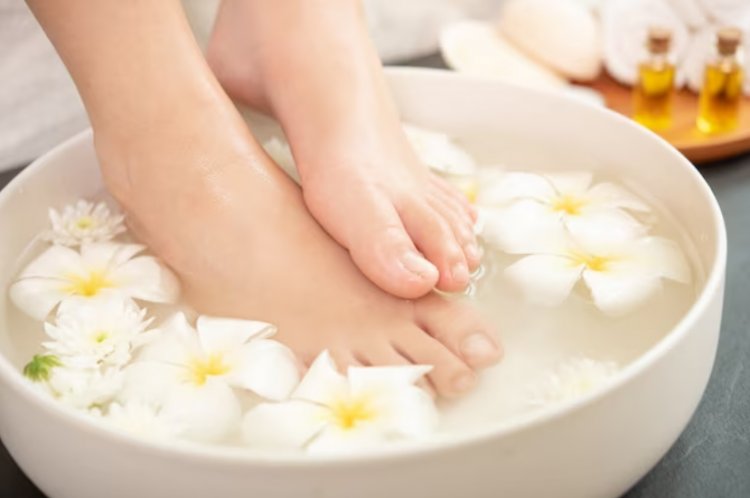Athlete's Foot: Causes, Symptoms, Treatment, and Prevention
Athlete's foot, also known as tinea pedis, is a common fungal infection of the skin on the feet. It is caused by various types of fungi, most commonly the Trichophyton species. Athlete's foot is highly contagious and can spread through direct contact with an infected person or by coming into contact with contaminated surfaces such as floors, towels, or shoes in public places like locker rooms, swimming pools, and communal showers. #AthletesFoot #FungalInfection #FootFungus #SkinInfection #FeetTreatment #AthletesFootCauses #AthletesFootSymptoms #AthletesFootTreatment #AthletesFootPrevention #FootHygiene

Causes
Athlete's foot is caused by fungi that thrive in warm, moist environments. Factors that increase the risk of developing athlete's foot include:
- Walking barefoot in public places: Fungi responsible for athlete's foot can live on floors and surfaces in public areas, making it easy to contract the infection by walking barefoot.
- Wearing tight, closed-toe shoes: Shoes that trap moisture and heat create an ideal environment for fungi to grow.
- Sweaty feet: Excessive sweating provides the moisture fungi need to thrive.
- Poor hygiene: Not washing feet regularly or drying them thoroughly after bathing can contribute to the development of athlete's foot.
- Weakened immune system: Individuals with weakened immune systems are more susceptible to fungal infections like athlete's foot.
Symptoms
The symptoms of athlete's foot can vary from person to person, but common signs and symptoms include:
- Itching: Athlete's foot often causes itching, burning, and stinging sensations on the affected skin.
- Redness and inflammation: The skin affected by athlete's foot may appear red, swollen, and inflamed.
- Cracking and peeling: The skin may become dry, cracked, and flaky, particularly between the toes.
- Blisters: Fluid-filled blisters may develop on the affected skin.
- Odor: Athlete's foot can cause a foul odor, especially if the infection becomes severe or if there is a secondary bacterial infection.
Treatment
Treatment for athlete's foot typically involves antifungal medications, which are available over-the-counter or by prescription. Common treatments include:
- Topical antifungal creams or ointments: These medications are applied directly to the affected skin to kill the fungi causing the infection.
- Antifungal powders or sprays: These products can help keep the feet dry and prevent the spread of infection.
- Oral antifungal medications: In severe cases or when the infection does not respond to topical treatments, oral antifungal medications may be prescribed by a healthcare provider.
Prevention
To reduce the risk of developing athlete's foot, consider the following preventive measures:
- Keep feet clean and dry: Wash your feet daily with soap and water, and dry them thoroughly, especially between the toes.
- Wear clean socks and shoes: Change socks regularly, and choose socks made of moisture-wicking materials. Rotate your shoes to allow them to dry completely between wears.
- Protect your feet in public places: Wear flip-flops or sandals in locker rooms, communal showers, and other public areas where fungi may thrive.
- Avoid sharing personal items: Do not share socks, shoes, towels, or other personal items with others, as this can spread fungal infections.
- Use antifungal products: Consider using antifungal powders or sprays on your feet and in your shoes as a preventive measure, especially if you are prone to athlete's foot.
In conclusion, athlete's foot is a contagious fungal infection of the skin on the feet that can cause itching, redness, cracking, and discomfort. Fortunately, it can be effectively treated with antifungal medications and prevented by practicing good foot hygiene and taking preventive measures. If you suspect you have athlete's foot, consult a healthcare professional for an accurate diagnosis and appropriate treatment.
Discover Coupoly's exclusive Medical Concierge Service, connecting you with renowned doctors and clinics, whether in the UK or abroad.
Get in Touch
Disclaimer:
The information provided in this article is for educational purposes only and should not be considered medical advice. If you have any health concerns or are experiencing symptoms, it is important to consult with a healthcare professional, such as a doctor or clinic, for proper diagnosis and treatment. Always seek the advice of your doctor or other qualified health provider with any questions you may have regarding a medical condition. Do not disregard professional medical advice or delay in seeking it because of something you have read in this article.
What's Your Reaction?





















